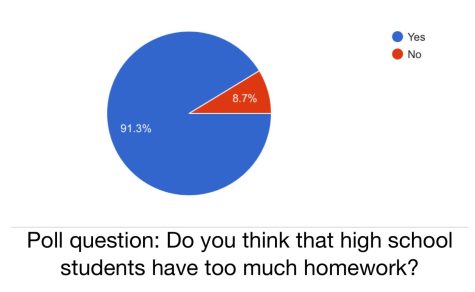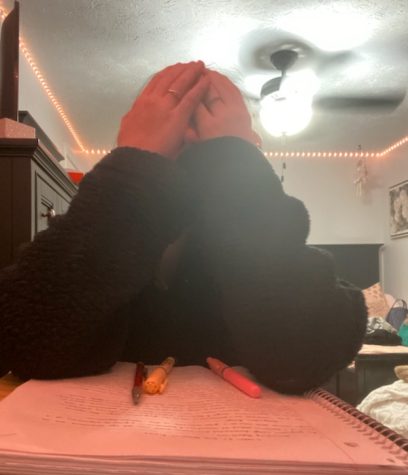Homework: stress or success?
The demands of homework are making students more stressed than ever.
Student A comes home from a long, exhausting day of school just to finish hours of homework late at night and get little sleep for the next day. Student B goes to practice right after school for hours and comes home to rush through their homework in hopes of getting a few hours of sleep in. Both of these students have something in common: HOMEWORK is forcing them to get less sleep.
Many Norwin students complain about the amount of homework that they get on a daily basis. Most students get hours of homework to do at night, forcing them to rush through things to get everything done for the day and get some sleep. While students’ arguments are valid, others say that it is not the amount of homework that causes stress, but the way in which students proceed to complete or not complete it.
Over 90 percent of Norwin students responded in a recent survey that high school students have too much homework.

“Homework tied in with sports and clubs just makes everything worse,” freshman Olivia Lane said. “I’m expected to do good in sports and clubs and keep up good grades on top of sleeping well. I can’t do that, so then stress comes into play. It’s very stressful to keep up this perfect image of myself.”
Most students have to come home from school or sports practice to do multiple hours of homework even though the recommended amount of time that students should spend on homework is much less.
According to an article in Healthline, the National Education Association (NEA) and the National PTA (NPTA) suggest students should have 10 minutes of homework per grade level (9th grade = 90 minutes). Both of these organizations agree on setting a limit on after school studies. The “10 minute” standard is manageable for all students, even ones in high school. However, high school students seem to have much more homework than what the 10 minute rule suggests.
When Norwin students were polled, over 50 percent said that they had at least 2 to 3 hours of homework a night, and about 14 percent of that number had three or more hours of homework a night.
The numerous hours students spend on homework can lead to less sleep and more stress.
“As a senior, I am finding it harder than ever to keep up with work, school, and the decision-making process with college applications,” said Ashley Cumpston. “I think everything is overwhelming and that’s why I get stressed out.”
While students’ stress levels seem to be high and the hours of sleep they get seem to be low, some teachers at Norwin say that the amount of homework high school students have can be justified and is needed for them to excel.
”If you want to be good at anything you have to practice, thus homework is a classroom’s way of practicing,” said Norwin High School math teacher Mr. Brian Brozeski. “Like sports or the arts you have to have appropriate and ‘good’ practices, otherwise you are practicing bad habits.”
Other teachers disagree with these sorts of statements and think that students should have little homework based on their busy outside lives.
After a full day at school, many students head to practice or work for the evening. After which, they have 7 periods of homework to complete. Students are left with little to no time to spend with friends, family, or themselves. Excessive homework does not promote a healthy work-life balance.
As 60% of Norwin students get four to six hours of sleep a night, which is at least two hours less than the recommended amount, excessive amounts of homework could be seen as the cause.
Students and teachers disagree on the true effectiveness of homework, but studies can show us what deems homework as effective or ineffective.
In a study at Stanford University, over 4,000 surveyed high school students proved that too much homework can be ineffective. Students will be able to feel the benefits of homework more when given one and a half to two and a half hours of homework at the most.
If high school students had less homework, making it more effective, they would be able to relax more outside of school.
According to CNN research, too much homework can hurt students’ social skills, self-confidence, and attitudes about life. 57 percent of students polled at Norwin said that their stress levels were a seven or above (on a scale of one to ten), reflecting the research done in the CNN article.
When it comes down to it, both sides of the argument about homework could be proven based on different statistics and people. One side says that students should not have homework at all at night while others advocate for moderate amounts of homework to be used as practice outside of the classroom.
But, what is known about the great homework debate is that students should not have hours upon hours of homework with no breaks in between. High school students should have time to relax. Students should not hope to get just a few hours of sleep a night. Students should get enough sleep, time to relax, and manageable work just as adults in the workforce do. Homework should make students succeed, not dive into a deep pool of stress.
In the end, homework has to help students become the best they can be. If it does not fulfill this cause, it is worthless and proves one thing: the argument students put up against homework is true.








